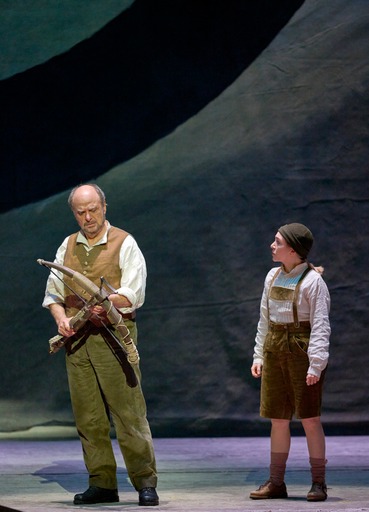In this revival of David Pountney’s 1998 production of Guillaume Tell),(the French version), miniature Swiss chalets line the front stage. Then BULLSEYE! A huge target board, indented, marked with arrows, behind a veiled stage curtain, as Rossini’s iconic, tremendous overture plays out. And the signature (William Tell) theme, first flute, oboe, and then those trumpets, to the galloping crescendo. Sensational! Played by Vienna State Opera’s full orchestra, under French-Swiss conductor Bertrand de Billy.
Swiss villagers occupy the stage, representing their homeland, sitting between the scaled-down chalets. ‘What a bright day is promised’, they sing, along with Vienna State Opera’s Chorus. ‘And let our labours pay homage to the breadth of the universe.’ This bucolic, idealised image of tranquility- the sets (Richard Hudson) in natural, pastel colours; the stage backdrop finally returned to after they’ve achieved independence from their occupying (Austrian) oppressors.
A fisherman is enticing his woman, ‘you shy young thing’, into his boat, somehow floating alone across the stage. ‘The cloudless heavens promise a beautiful day’, Carlos Osuma sings. But down to earth, what a burden life is for us, without a homeland, sings Guillaume Tell.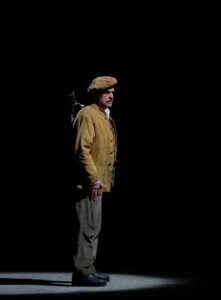 Roberto Frontali looks the burgher, in a tweedy jacket and sleeveless slipover. While the the fisherman sings, Melcthal the village elder despairs, ‘ Helvetia cries, weeps for its freedom.‘
Roberto Frontali looks the burgher, in a tweedy jacket and sleeveless slipover. While the the fisherman sings, Melcthal the village elder despairs, ‘ Helvetia cries, weeps for its freedom.‘
This opening scene is an idyll, evoking a state of grace, the fisherman, the mystery of the sea, calling not to betray the secret of love; while Tell, mantra-like, sings of being without a homeland. Chorus sing when their work ends, the festival begins -unobserved by their rulers. Chorus’ refrain, ‘we all celebrate this beautiful day, work, marriage, and love.’ Tell sings of fleeing from the Tyrants, protecting his fortune, to be married, and a father. But Melcthal admonishes Arnold, ‘Hear me son: to be a father is the greatest good. Will you continually disappoint me? The harvest festival ties three married couples- but not yours.
But Arnold (in his aria) cannot keep silent when unendurable love rules all his senses. -‘You, whose head will wear the crown, O Mathilde, I love you! and thus betray my duty, my honour, my father, and my Land!’ He’s given up his youth for misery. Fateful love! He hears echoes of enemy forces. Gesler is there, Mathilde accompanying him.
On a full stage, giant puppets dominate, the Matriarch and Patriarch, Swiss archetypes. Melcthal is enthroned, opposite Hedwige, symbolising homely values. At last the stage, hitherto monochrome, bursts into full colour. Hedwige is wreathed in flowers, high above the milling crowds of villagers, their thrones on stilts. And the puppet Melcthal’s arms move, but the thrones high-up are occupied by real human figures, Monica Bohinec (Hedwige), and Solodovnikov (Melcthal).
Why are you shaking, Tell asks Arnold. In their duet-a highlight- (Arnold) have I the strength to pretend, can I be unhappier? Tell knows he’s hiding a secret. Why keep quiet any longer? (Over his beloved, Mathilde.) Tell can sense Arnold’s conflict raging, to sacrifice his love and passion for his country. Tell sees Arnold blush; has he betrayed his country. 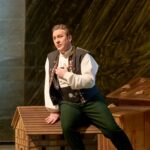 ‘From fearsome slaves, we will be men, and we will win.’- And glory? -Tell, I don’t know what glory is, but I do know the chains of slavery. In this dramatic highpoint, two powerful characters are pitted in a titanic struggle, Tell to rescue Arnold from a treacherous love affair. To persuade Arnold to fight- in their ranks- against tyranny. And Frontali’s mellow baritone and Osborn’s lyrical tenor are up to the operatic challenge.
‘From fearsome slaves, we will be men, and we will win.’- And glory? -Tell, I don’t know what glory is, but I do know the chains of slavery. In this dramatic highpoint, two powerful characters are pitted in a titanic struggle, Tell to rescue Arnold from a treacherous love affair. To persuade Arnold to fight- in their ranks- against tyranny. And Frontali’s mellow baritone and Osborn’s lyrical tenor are up to the operatic challenge.
The stage fills with white cartwheels painted with insignia. ‘Glory and honour to the son of Tell. Praise his ingenuity,’ the Chorus sing. In a superbly mounted pageant, couples in white, red-embroidered, and quirky, quaint Swiss hats. Then gunshots sound out. Fierce Hapsburg soldiers descend from the upper stage. Levichold is fleeing; what is he afraid of, their rage. He’d saved his only daughter, his white shirt’s blood-splattered. Tell the daughters, God will protect us, sing the people’s Chorus. Confound the oppressors! The gleam of armour, fearsome Hapsburg soldiers on the loose. A Swiss man shouts, Protect our children.
The Act 2 stage, for the clandestine meeting of Arnold and Mathilde, is nocturnal, shrouded, gloom-filled. 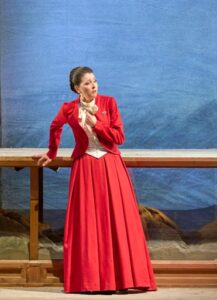 Lisette Oropesa’s Mathilde, hitherto seen in red dress-white blouse- Austrian colours, Osborn’s Arnold in loden green, excel in their duet. She sings movingly that she prefers his gloomy forest to her glamorous palaces. But he sing he needs to travel, to prove himself in battle, to be worthy of her. But serving the Austrian Hapsburg rulers? (She’s the King’s daughter.) Yet Heaven has made her for him. He will flee his homeland, his father, to die in a foreign land.- Say one word.’- Stay!- He sees in her eyes the secret of her soul. They cannot stifle passion, the flame consumes them both.
Lisette Oropesa’s Mathilde, hitherto seen in red dress-white blouse- Austrian colours, Osborn’s Arnold in loden green, excel in their duet. She sings movingly that she prefers his gloomy forest to her glamorous palaces. But he sing he needs to travel, to prove himself in battle, to be worthy of her. But serving the Austrian Hapsburg rulers? (She’s the King’s daughter.) Yet Heaven has made her for him. He will flee his homeland, his father, to die in a foreign land.- Say one word.’- Stay!- He sees in her eyes the secret of her soul. They cannot stifle passion, the flame consumes them both.
Tell arrives with henchman Walter, to remind him of their oppressors. She is our enemy; will he fight and serve Gesler? The news is that Melcthal, Arnold’s father, has been slain by the executioner. (Is it a plot?) Tell consoles Arnold, torn by feelings of guilt. But demands, the choice is between independence or death. On a darkened stage, men from the Cantons appear. All swear their solemn allegiance to Tell, and the order for battle.
Decapitated, the truncated body of Melcthal strewn centre-stage: it was Gesler. Mathilde’s now in black, she can mourn him with Arnold. It was destiny. Oreposa sing tenderly, ‘her breast will forever preserve the image of the liberator’, her soprano with stunning coloratura.
The stage market place prepared for celebrations of 100 Years Hapsburg rule: there are horrible ‘concrete’ trenches, overlooked by the grim occupying forces on the upper galleries. Yes, the Emperor himself will curse Tell’s rebels, Gesler excellently sung (Jean Teitgen). There’s a ballet- a feature of French Grand Opera, here a welcome relief from the unrelenting gloom.
We see Gesler arrogantly drop an apple. There’s a line of synchronized model soldiers, like on a rifle range. Now the real thing! Zombie-like soldiers, silver, grey helmets, carrying a huge flag bearing Hapsburg insignia. They drive the Swiss women away. Terrorise them. Prod them with flag poles (like bayonets.) Gruesome. They goose-step in black ‘leather’ coats. ‘In vain the rebels deny my laws’. They must submit, commands Gesler with weary arrogance. Everybody present must bow down to his hat! Of course Tell refuses. ‘Would I stand before you if I feared death!- So this is the feared Archer, mutters Gesler. Tell hugs his son Jemmy, who shakes his head (Maria Nazarova.)- ‘Don’t be afraid! My place is here. Let me die in your arms’.Siezed by Gesler, -Is this your child?- his salvation is in your hands.
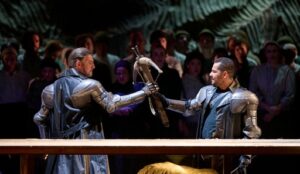 There’s a long table, stage-length.. Gesler acts as umpire, on top of the table. ‘My father, remember your skill’. Jemmy, to one end of the table; Tell opposite end with a crossbow. The apple got smaller. Don’t move! (I’m watching it eyes-wide-open! Tell puts the crossbow down. (Did it happen?)
There’s a long table, stage-length.. Gesler acts as umpire, on top of the table. ‘My father, remember your skill’. Jemmy, to one end of the table; Tell opposite end with a crossbow. The apple got smaller. Don’t move! (I’m watching it eyes-wide-open! Tell puts the crossbow down. (Did it happen?)
For whom was the second arrow intended? Gesler will chain them up, then.. Mathilde interjects, in the name of the Sovereign, she protects Jemmy, defying Gesler. Black-coated, silver-hatted Austrians like bluebottles. Their arrogance has led them astray, sing Chorus. Cruel law! Mathilde, he’s preparing Tell’s death, a curse on Gesler! Soldiers are taking defiant Swiss women hostage.
In a mournful aria, Arnold sings of seeing the beloved walls of his father’s house the last time. In ‘Don’t leave’- his rage becalmed, then he’s silent. Mon pere est mort, his aria laments. Mathilde appears with Jemmy, offering him as a reward for Tell’s returns. Jemmy runs, as a signal for the rebels. Suivez-moi amis!
The puppets are wheeled on, Hedwige the matriarchal protector. Clouds mystify the action. Tell captures Gesler’s boat, troups have freed their village. The storm subsides, the landscape ever-more beautiful. What pure air! Glorious scenery, now that the Swiss are free. Outstanding production. Hopefully, Vienna won’t wait another 20 years for Rossini’s masterpiece. © PR
Photos: Roberto Frontali (William Tell); Lisette Oropesa (Mathilde); John Osborn (Arnold) Jean Teitgen (Gesler) © Michael Pöhn/ Wiener Staatsoper

